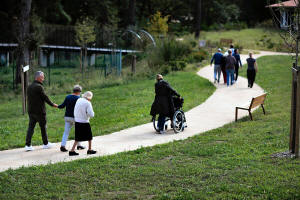French 'Alzheimer's village': where nursing home meets the outside world
 Send a link to a friend
Send a link to a friend
 [October 02, 2020]
By Emilie Delwarde [October 02, 2020]
By Emilie Delwarde
DAX, France (Reuters) - Residents of the
purpose-built village near Dax in southwestern France shop for
groceries, get pampered at the hair salon and enjoy music recitals just
like anyone else.
But this is no ordinary gated community - each of its 105 permanent
residents has Alzheimer's disease.
The village offers the care of a nursing home in an environment dressed
up as the outside world to soften any sense of painful rupture with the
past, preserving a measure of autonomy and daily routine that may help
slow the advance of dementia.
Madeleine Elissalde, 82, was among the first to move in when the
village, the first in France and modelled on one in the Netherlands,
opened in June. She says she likes the surrounding countryside and the
shared house she lives in.

"It's like being at home," Elissalde said. "We're well looked after."
For a while after she was diagnosed, Elissalde lived with her daughter
before moving in with another of her children. The moving around seemed
to compound her memory loss, her family said.
But now that her daily reference points are more constant, her family
say the memory loss has stabilised and she is able to live a more
independent life than she would in a nursing home.
SLOWING THE DISEASE?
"Her memory loss is less severe," Elissalde's grand-daughter Aurore said
as the two took shelter from the rain. "She's happy, she's rediscovered
her enjoyment of life."
[to top of second column]
|

Alzheimer's patients walk at the Village Landais Alzheimer site in
Dax, France, September 24, 2020. REUTERS/Gonzalo Fuentes

Each resident pays nearly 24,000 euros a year in fees. More than
half the 6.7 million euro running costs are subsidised by public
authorities.
Researchers from France's National Institute of Health and Medical
Research are paying close attention. They want to know whether the
village model can alter the clinical trajectory of the disease and
whether it offers value for money.
The village has a cafeteria, a library and music room. Its shop
provides fresh fruit and vegetables, and flour and chocolate for
baking cakes. There are no nurses in white coats.
"We don't have a till," said Christine Surelle, who volunteers in
the shop. "Our currency of exchange is smiles."
Her store is as much a place for human contact as it is a place to
obtain essential necessities, she said.
"It's to maintain their sociability, to maintain a contact with the
old world they once knew, to ensure there is no brutal break with
the past."
(Reporting by Emilie Delwarde; Writing by Richard Lough; Editing by
Gareth Jones)
[© 2020 Thomson Reuters. All rights
reserved.] Copyright 2020 Reuters. All rights reserved. This material may not be published,
broadcast, rewritten or redistributed.
Thompson Reuters is solely responsible for this content.
 |